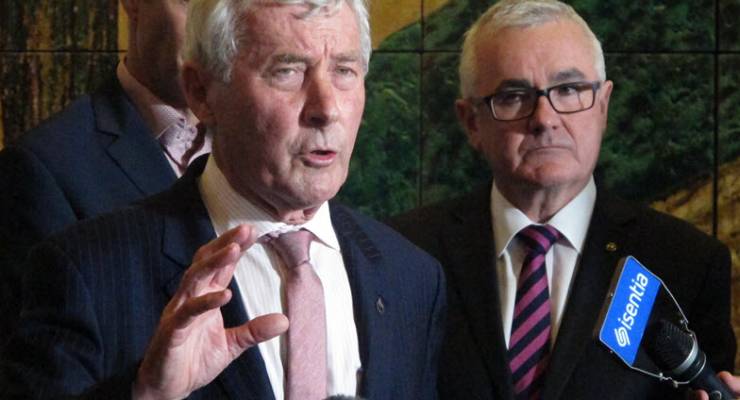
Is a decision looming over whether Bernard Collaery’s trial will be held in open court? Plus The Australian continues to run interference for Dyson Heydon, and Quillette will defend your right to free speech to the death (unless it offends them). Plus other tips and murmurs from the Crikey bunker.
Welcome to the police state It seems that soon, we will know how much will be made public about one of Australia’s great hidden crimes. Since late May the pre-trial hearing for lawyer Bernard Collaery (who advised intelligence whistleblower Witness K) has been running behind doors not so much closed as bolted shut.
Several high profile figures — including former foreign minister Gareth Evans, retired admiral Chris Barrie and former Timor-Leste leader Xanana Gusmao — have provided arguments that the trial should be in open court.
We hear that the judge’s decision on whether Attorney-General Christian Porter’s certificate — asserting that certain evidence will prejudice national security if heard in public — will be delivered at 2:15 pm this Friday, June 26.
News Corp watch Since the Dyson Heydon scandal broke, The Australian has been doing what any quality paper would do — muddying the waters in defence of a powerful man credibly accused of sexual harassment by several women over the course of several years.
First questioning whether the former judge had received “procedural fairness“, today the paper reports that the inquiry’s findings were reached without hearing “one word” from Heydon. But there’s some equivocation going on there — as yesterday’s piece noted, Heydon was “permitted to inspect written allegations and was allowed to provide a response that was considered by the investigator” before a decision was reached.
Indeed, according to one of the reporters who spent years chasing this story Jacqueline Maley, Heydon simply declined to be interviewed or provide a statement.
That was then, this is now Nine has given another platform for Liberal backbenchers to attack superannuation, this time demanding a freeze on compulsory contributions as part of a broader agenda to halt the growth of industry (or “union-backed”) super funds. But opposition isn’t universal — many feel that the current 9.5% contribution is actually insufficient:
The contribution rate is not yet high enough to provide fully-funded retirement incomes … [it] is lagging behind the 15% required over a working lifetime to get the majority of Australians to a privately funded retirement.
Who said that? Why, one Andrew Bragg in a 2015 op-ed written when he worked for the Financial Services Council.
As for the argument that super should be used to fund housing, now-Senator Bragg had this to say: “superannuation is not for housing, estate planning or a honey pot for governments with short term fiscal problems”. He’s very much changed his tune since, but we wonder if that will be mentioned next time Nine amplifies a Liberal Party attack on super?
Freedom Fighters You can set your watch to it. Yesterday columnist Sean Kelly briefly observed that Quillette “has been happy to publish authors known for promoting theories of white supremacy”. (He hasn’t been the only one to make such an observation.)
Quillette founder Claire Lehmann, doing her bit for free speech and “broadening the Overton Window“, responded with a loaded reference to Australia’s complainant- friendly defamation laws.

“This is going to be fun” she tweeted, presumably referring to the ability of people with money to shut down debate in Australia using the court system. And while we’d never dare quibble with the leader of the… sigh… “intellectual dark web”, we’re not sure what her being born in Australia has to do with defamation law.
Elsewhere, did whoever penned this Oz editorial (“the war on humour is not a joke”) have a word with Chris Kenny?
Have you got a tip for Crikey? Let us know.








Its a minefield to get into the Heydon story, but I expect the ex-high Court Judge has very good legal reasons to ‘decline to make a statement’ to CJ Keifel’s enquiry.
Certainly the evidence of 6 non-colluding women would be powerful enough to damn Heydon, but the affair puts CJ Keifel into territory she might find quite difficult.
Assuming that Heydon has committed these social crimes if not (but maybe) legal crimes of which he is accused, any future court action by or against him, could end up in the High Court.
Has the High Court already spoken as to Heydon’s guilt in the public release of its investigation?
Would all the judges would have to stand aside if Heydon’s possible legal cases ended up pointing there on appeal? Would the fact of CJ Keifel’s actions possibly cutting off the pathway to the High Court prima facie prevent Hayden getting a fair trial in any court?
Should CJ Keifel kept confidential to the parties the investigation report until any legal actions resulting therefrom were completed? We saw elaborate suppression orders in the Pell conviction trial to ensure he got a ‘fair’ trial in the follow-up Pool case which collapsed on the first day in court.
A lot of questions for constitutional lawyers there, including whether impartial judges might be co-opted to hear such proceedings.
The probability of this ending up in the High Court seems low. I suspect that Kiefel CJ, being an astute lawyer, thought of these things and decided that it was in the best public interest not to sweep this matter under the carpet for however many years might elapse before the unlikely eventuality of a High Court appeal came about.